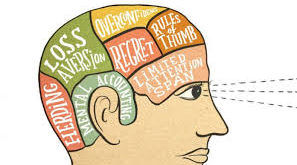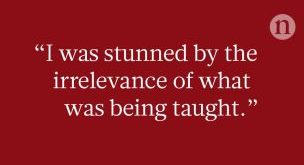Det pågår en lågintensiv jordbävning i den ekonomisk-politiska debatten. Mantrat sedan 1990-talet om att det alltid är klokt att spara i ladorna – det som på ekonomspråk kallas överskottsmålet – håller på att ifrågasättas av både politiker och ekonomer … Baserat på en gedigen bilaga av professor Lars Calmfors landar [Långtidsutredningen] i slutsatsen att ett underskottsmål på 0,5 procent av bnp och ett skuldmål kring 45–50 procent av bnp är både klok och hållbar politik....
Read More »Are we all behavioural economists now?
Are we all behavioural economists now? Postwar neoclassical economics was a reaction against a set of approaches based on the principles of hedonic psychology … Various developments in positive and normative economics had reassured them that references to unobservable entities were not only illegitimate but also dispensable. Thus, the concept of preference came to be the primitive notion of economic theory, and references to psychological theory were to be...
Read More »Why economics is an impossible science
Why economics is an impossible science In a word, Economics is an Impossible Science because by its own definition the determining conditions of the economy are not economic: they are “exogenous.” Supposedly a science of things, it is by definition without substance, being rather a mode of behavior: the application of scarce means to alternative ends so as to achieve the greatest possible satisfaction—neither means, ends, nor satisfaction substantially...
Read More »Den farliga statsskuldsretoriken
Publiceringen av Finansdepartementets långtidsutredning och den inledda översynen av budgetramverket har startat en livlig debatt. Själv har jag i en bilaga till utredningen – liksom den – förordat ett underskottsmål på 0,5 procent av bnp i stället för dagens överskottsmål på 1/3 procent av bnp och att skuldankaret, riktmärket för den offentliga sektorns skuld, höjs från 35 till 45-50 procent av bnp. Förslagen har från flera håll i högt tonläge kritiserats för att utgöra ett...
Read More »Les mensonges de la ministre de l’Éducation, Amélie Oudéa-Castéra
Les mensonges de la ministre de l’Éducation, Amélie Oudéa-Castéra La ministre de l’Éducation, Amélie Oudéa-Castéra, a récemment été au cœur de plusieurs scandales qui ont secoué le paysage politique français. Ces scandales ont soulevé des questions sur son leadership, sa gestion et son intégrité en tant que responsable de l’éducation nationale. [embedded content]
Read More »Nytt finanspolitiskt ramverk? Ja tack!
Nytt finanspolitiskt ramverk? Ja tack! Förhållandet mellan ränta och BNP:s tillväxttakt är central för hur man ska se på den offentliga förmögenhets- och skuldutvecklingen. En positiv ränte-tillväxtdifferens innebär att det finns en intertemporal målkonflikt: ett lägre primärt finansiellt sparande (högre offentliga utgifter i förhållande till offentliga intäkter) idag måste betalas med högre primärt sparande (lägre offentliga utgifter iförhållande till...
Read More »Religious politics — the greatest threat to democracy
Religious politics — the greatest threat to democracy Religious politics are the greatest threat to democracy, more than social or economic inequality, lying politicians, or corruption, all of which are bad enough. Liberal democratic institutions exist to resolve conflicts of interests. Disputes over taxation, land use, farm subsidies, and so on, can be settled through argument and compromise between political parties. Sacred matters, however, cannot. God’s...
Read More »Hon kom över mon
Hon kom över mon .[embedded content]
Read More »Mainstream economics — an explanatory disaster
Mainstream economics — an explanatory disaster To achieve explanatory success, a theory should, minimally, satisfy two criteria: it should have determinate implications for behavior, and the implied behavior should be what we actually observe. These are necessary conditions, not sufficient ones. Rational-choice theory often fails on both counts. The theory may be indeterminate, and people may be irrational. In what was perhaps the first sustained criticism...
Read More »Daniel Waldenström och andra livsfarliga nationalekonomer
Om jag ska plocka fram det som jag i efterhand har värdesatt mest från min ekonomiutbildning så var det kursen i ekonomisk historia … Framför allt så fick vi läsa boken ”Manias, Panics and Crashes: A history of Financial Crises” av Charles Kindleberger. Den gav ett mycket intresseväckande perspektiv på kapitalismen och den ekonomiska utvecklingen under de senaste århundradena, som just kantats av finansiella krascher … Det som hände i Sverige i början på 90-talet var precis...
Read More » Lars P. Syll
Lars P. Syll








